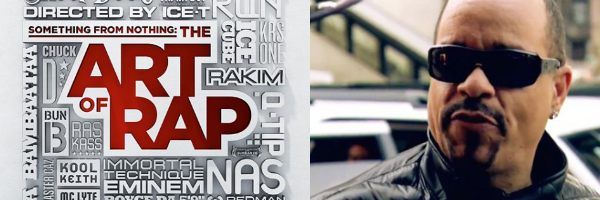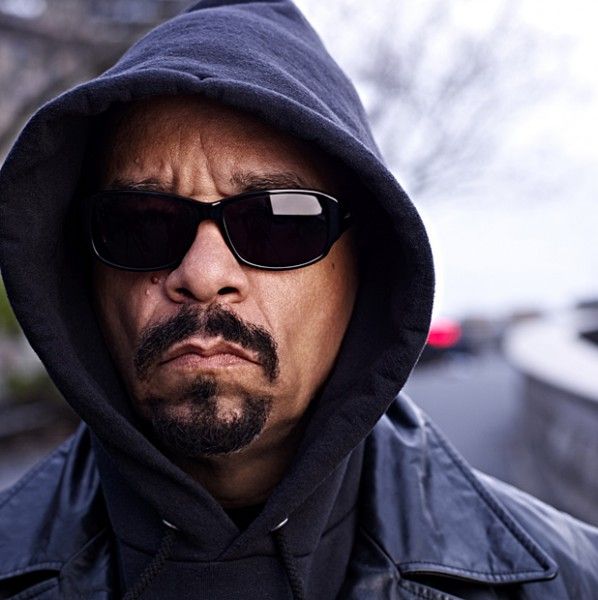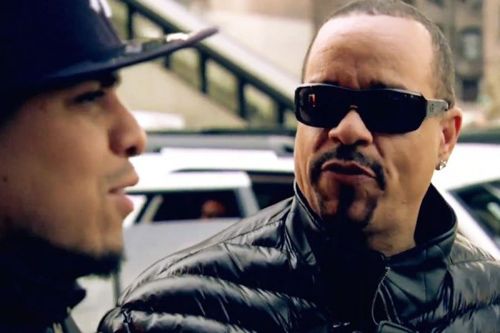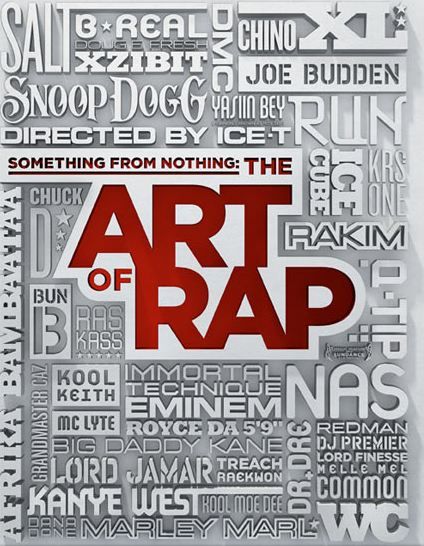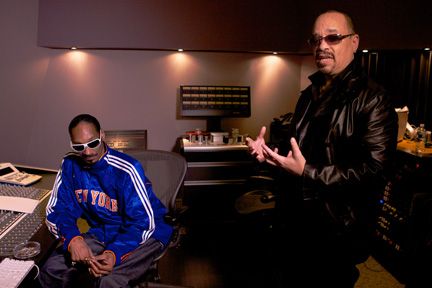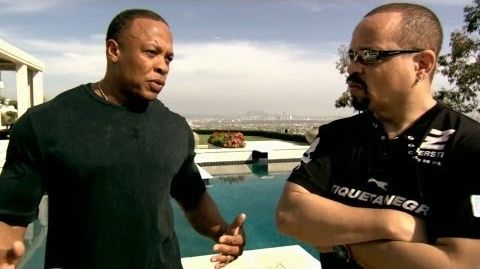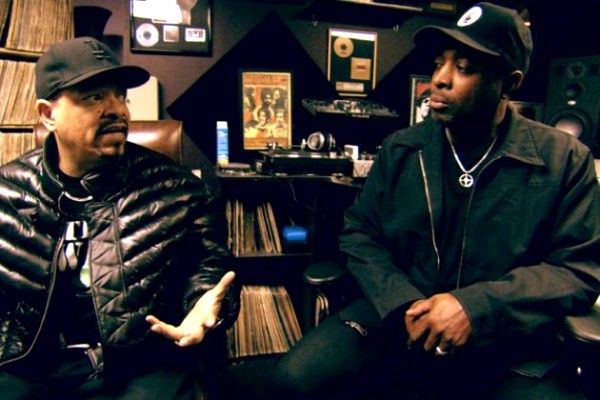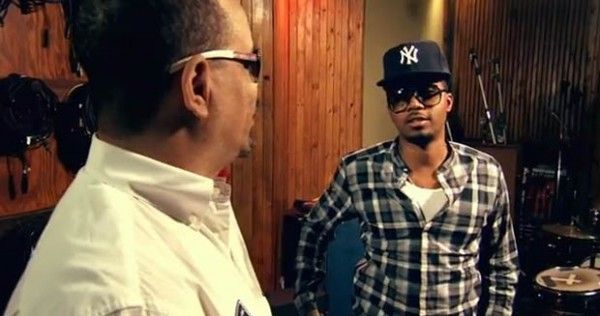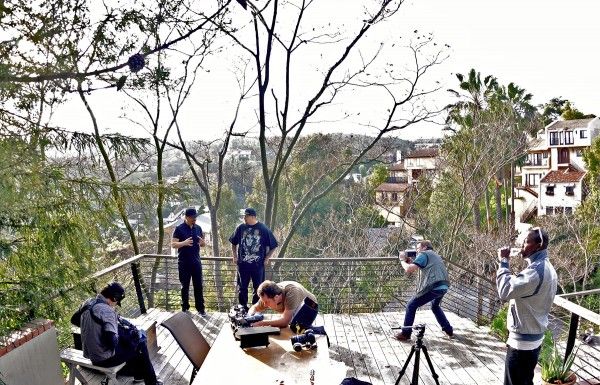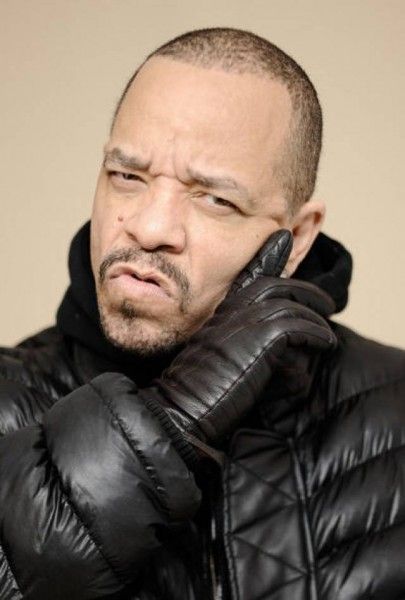The fascinating and compelling documentary Something From Nothing: The Art of Rap marks the directorial debut of rapper/actor Ice-T. With honest interviews and freestyle rhymes by some of the masters of the music, the film showcases the origins of the hip-hop culture that ultimately saved the life of its filmmaker. Focusing on the craft and the skill, rather than the money, the girls and the cars, it’s an in-depth look inside the minds of rap legends from coast to coast and is a tribute to the art form that brought poetry to a new generation.
During this recent exclusive phone interview with Collider, Ice-T talked about what inspired this documentary, lining up the talent that is showcased in the film, the shooting and editing process, what he’d like to do with all the extra footage (his first cut was six hours long), how he got respect from other artists when he was starting out, what it takes for him to respect another rapper, how he feels about rock bands that incorporate rap into their music, what he thinks about white fans singing along to rap lyrics that include certain taboo words, what he’d like to be remembered for in hip-hop culture, and where he’d be right now without rap in his life. He also talked about where he’d like to take his career as a director next. Check out what he had to say after the jump:
Collider: What inspired this whole thing for you? Was it your desire to direct, and then you had to decide what the project would be, or did you want to say something about rap music, in particular?
ICE-T: It was both. I always knew that I had to direct. That was something I’d wanted to do. Finally, I was just looking at the situation and I said, “I wanna document hip-hop, as an art form, seeing how a lot of people don’t take it seriously.” I called my friends up and I said, “I wanna talk to you about it, but I don’t want to talk about the money, the girls and the cars. I wanna talk about the craft.” And everybody was with it. So, our only goal was to make it into Sundance, and we made it into Sundance. The next thing you know, Indomina picked it up and now we have a theatrical release, so we’re overwhelmed.
As a successful rapper yourself, was there a moment when you realized that you were part of a bigger picture?
ICE-T: I knew it when I came in because I was an L.A. rapper and I wanted to be part of New York. I wanted to be part of the real scene. It was a rite of passage. I had to go to New York and meet with the Zulu Nation, and have them come and tell me how serious this was before they gave me the pat on the back. After that, I’ve always tried to respect the craft. Now, there’s people that get in the game, they don’t know anything about the culture and they’re just rapping. At some points, they’re disrespectful, and I think they wouldn’t disrespect it, if they knew where it really came from.
Did everyone just open their doors to you, when you approached them about being in the film, or did anyone need some convincing?
ICE-T: I only used my friends in the movie. I didn’t have anybody that I really didn’t know or have a good connection to. Everybody knew that I was going to handle this correctly, so they trusted me to be open and to make a film that they would be proud of. No one in the film is shown in a light they don’t like. Everybody loved it. I’ve got people who we made calls to and they couldn’t be reached because they were working or whatever, and they’re sick right now [that they’re not in it].
Did you go in prepared, with questions for each of the artists?
ICE-T: I had 15 questions, and I asked all of them the same ones. That way, I would be able to edit and have one person start a question and another one finish it. That’s all I had. We didn’t want to use any stock footage and we didn’t want anyone to say any rhymes that anyone had ever heard before. We just wanted to get into Sundance. Those were our marching orders.
Was there anyone you were most excited about picking the brain of?
ICE-T: Not really, ‘cause I know all these cats. I knew that KRS-1 was going to be explosive and really animated. I knew which cats were going to be deep, like Mos Def. I already know these guys, so I knew how they were going to react. I think Eminem gave me real open, serious answers and replies. A lot of times, when you talk to artists and put a mic in front of them, I call what they’re doing “a drop.” They’re doing a promotional plug. If you throw the mic in front of me and go, “What’s up Ice?,” I’m like, “Yo, I’ve got my album coming out!” We go right into promotional mode. It’s not really a conversation. It’s more of me doing a radio drop. You never hear them talk. This is a global movement. This is something that people are doing in China and Russia and everywhere, and it doesn’t come from something silly. It’s serious. People can make fun of it and people can play with it, but the reason these kids are successful and the reason it’s been such a big part of our culture is because it comes from something that’s really difficult to do.
How long did it take you to shoot this, and what was the editing process like?
ICE-T: Editing was a nightmare. We shot for two years and we had so much film that we started with a six-hour cut. Just trying to figure out who should be in the movie and how to cut it down was a challenge. You have to know the true dynamics of hip-hop. You have crews, so we were like, “Well, as long as we’ve got one person from that crew.” We had to do breakdowns like that, and then we had to keep a coherent voice going across the movie. We didn’t know how we were going to edit it. We just went out to get the interviews first. Then we said, “Why don’t we start it at the beginning, with Grandmaster Caz, and basically move it regionally, across the country.” That’s how we did it.
With so much footage that couldn’t make it into the film, would you like to include some of that on a DVD release?
ICE-T: There’s a lot of other plans for this, like television and things like that. It would make a great TV show, where you could interview two people in an hour and go in-depth. There are lots of outlets for it, but we don’t want to promote that yet. We want people to see the movie right now. You know how people are today. They’ll be like, “Oh, it’s going to be a TV show, I’ll wait.”
What does it take for a rapper to earn your respect?
ICE-T: You’ve just gotta put in your time. You’ve gotta show me that you’re sincere about it and, like Dr. Dre says, that you’re built for it, and you’re not just doing it ‘cause you think it’s a quick way to get some money. You’ve gotta study it. It takes time to be a good rapper. You have to practice. And then, you’ve gotta get on stage and show me that you can do it live. With MC-ing, which means being a Master of Ceremonies, not only do you rap, but you have to be able to control the crowd. You’ve gotta make the crowd move and have total stage dominance. A lot of cats can rap, but they’ll turn their back to the audience, or if they’re not doing their hot record, they’re lost. You can be a rapper, but taking it to that stage control is another level. Run DMC are masters of that.
How do you feel about the rock bands that incorporate rap into their music, like Rage Against the Machine and Linkin Park?
ICE-T: I think it’s separate, but it comes from rap. Rapping is a vocal delivery, so you can do it without being part of hip-hop and not knowing what hip-hop is about. I happen to know Rage and I know cats from Limp Bizkit, and I know they’re really rap heads. They love it. They might love it more than some of the kids that think they’re hip-hop. It’s all good for the culture. What’s bad for the culture is wack rappers that get held in high regard like they’re some great thing because it’s the flavor of the month, but everybody knows they can’t rap. I don’t think it’s hard, even for somebody who’s not hip-hop, to know that that’s not good. When you put them up against somebody that can really rhyme, you go, “Okay, I get it. This is what it should sound like.”
With every genre, there are artists who do it well and ones that don’t, but rap is the most vocal about when there are artists that don’t do it well. Do you think that’s because when you create something from nothing and have success with it, like with rap, that you feel a certain ownership of it, so that when somebody comes in who is wack, you want to be vocal about saying so?
ICE-T: Yeah, that’s right. Wack is a default word that was put in hip-hop for a reason. Hip-hop is a competition culture. It’s based around, “My DJ is better than you. My graffiti artist is better than you.” Break dancing is a competition dance. MC-ing is, too. So, we have no problem telling you that you suck. That’s just part of it. Half the rhymes you write, you’re saying that you’re better than the other MC. That’s how we keep the craft sharp. In the movie, when Chuck D says that Mele Mel called him out and said, “Y’all suck!,” I said, “How did you reconcile that?” And he said, “We got good.” Even in my career, I had people say, “Ice-T is wack! He sucks!” That just makes you want to be that much better. You don’t get mad, you get better. You prove ‘em wrong. Hip-hop is not going to just give you respect. Redman said that he knew he had a job to do, and that’s what made him that much better. He knew he couldn’t come out and just make average music and get a pass. He had to fight for it. That’s how he honed his sword, and now he’s devastating. Cats don’t want to even mess with him.
Obviously, it’s taboo to use the “N” word, but what are your feelings about white fans who go to rap concerts and sing along to the lyrics, when those lyrics are full of the “N” word? Is that acceptable because of the context?
ICE-T: Yeah, I think it’s acceptable in context. If I make a record and it’s called, “Nigga,” how am I expecting a white person to sing the record? You can’t get into that. The thing of it is that black people can be ultra sensitive. My thing is that you know when someone is using a word negatively. I might say, “Yo, that bitch,” and you go, “Okay, I got it.” But, you know when you’re being called a “bitch” in the negative sense and that’s when you should react to it. They’re all about Gwyneth Paltrow making a comment and tweeting the name of a song, but I’m like, “Come on, man, are you all really gonna get upset about this when you have real racists out there that really will call you a nigger and mean every bit of it, in the worst sense of the word. Y’all ain’t addressing them. Instead, you wanna address somebody who felt comfortable and who’s a friend of Jay-Z.” That’s just stupid to me. I live by the rule of, as far as those words go, they’re inside words. If you’re black, then you can say it. If you ain’t fat, don’t call people fat. If you are fat and you call your girlfriend a “fat ass,” you can say it. Same with skinny people or if you’re Jewish people or if you’re gay. Gays call each other “fag” and “queer.” My thing with these words is that, if it doesn’t apply to you, don’t use them. But, if you’re at a rap concert, it’s different. We set up a situation, as rappers, so we can’t get mad at it. It’s a toxic word and some people have weird reactions to it, but I don’t.
When you look back and think about hip-hop and rap, what do you want people to remember you and your music for, and what your place is in it?
ICE-T: I just want to be looked at as one of the people who not only created a style of rap, but was influential in taking care of the culture and standing up for the culture. I’ve gone to Congress and spoken on behalf of rap. Back in the days when they were trying to take us out, I was on Oprah and Donahue. I’ve been one of the soldiers on the front line, trying to get people to understand it. I was on The Today Show and the lady was like, “A lot of hip-hop is negative,” and I was like, “Well, if you open up Shakespeare and read it, you’re going to find things that might be considered negative. It’s an art form. It’s going to have positives and negatives. It’s your job to determine what you like and which part of it you enjoy.” People are quick to find the bad part of it and say that’s what the entire culture is about.
Now that this whole new aspect of your career has been opened up, where would you like to go next, as a director?
ICE-T: Well, I wanna do a feature. I want to do features. I wanna be the black [Quentin] Tarantino. I think there’s a lane there. You’ve got [Ice] Cube doing the fun movies. You’ve got Tyler Perry in his own lane. Spike [Lee] and John Singleton have got their own lanes. The only black director that I feel similar to is Antoine Fuqua. I think there’s an area for my vision. That’s my next plan. If this movie is a success, there will be a lot of opportunities for me to do that.
Having a name that’s synonymous with gangster rap, could you ever have imagined that you’d have a longtime job as an actor on Law & Order: SVU and that you’ve have your own reality show?
ICE-T: Honestly, I couldn’t imagine, back in the day, that I’d even have a legit job. This is all me opening new doors with the opportunities and just taking them. I’m a person that’s really comfortable with who I am. Whatever you want to call gangster, that’s just me. Whatever you see on Ice Loves Coco, that’s just me. There’s not a lot of image going on here. It’s really just a different moment, in how I handle the situation. People are coming around to me. I was kind of scary, early on. Now, they’re coming around and they’re like, “All right, we get it, Ice. We see what it is.” The reason they’ve got me playing a cop is because they wanted a bad-ass cop, so why not cast the street cat that understands how to put that energy out there. Who would have ever thought we’d be on for 14 seasons? I’m ready to do 20.
Without rap, where do you think you would be right now?
ICE-T: Oh man, if it wasn’t for hip-hop, I don’t know. I’d probably be in prison. I was actually on a different road. I was another road to what I thought would be success, and then I started to rap on the sidelines. I would go out and do whatever I was doing, and then I would go rap. And then, my friends started getting deeper in trouble and getting locked up, and they were like, “Ice, stick with that, man. Don’t come here.” I did the movie Breakin’, and that was my foot out of the game. I’d say people are victims of circumstances and they’re limited to the opportunities that they see. Even though there might be more opportunities, you might not see them. You might just think, “I don’t have any options.” You usually go to the dark side, in that situation.

